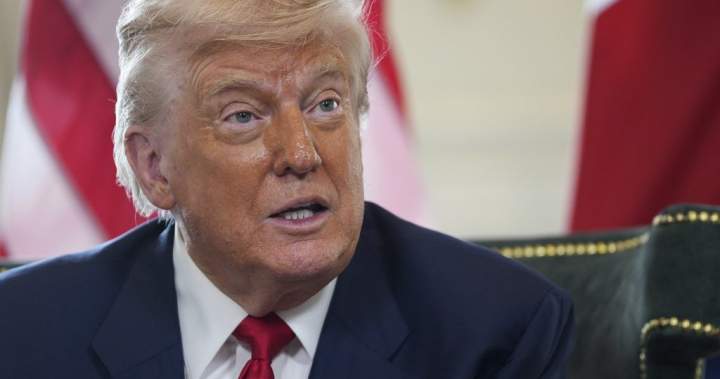U.S. President Donald Trump signed an executive order Thursday that will raise his tariffs on Canada to 35 per cent starting midnight Friday, a deadline he set for a new trade deal that has failed to materialize.
Trump also signed an executive order that will have new tariffs on a wide swath of U.S. trading partners to go into effect in seven days. The order keeps his “reciprocal” 10 per cent baseline tariff rate in place with higher rates for other countries that have yet to sign a new trade deal with the U.S.
The White House said Trump was raising the tariff rate because Canada “has failed to cooperate in curbing the ongoing flood of fentanyl and other illicit drugs” into the U.S., as well as Canada’s retaliatory tariffs on American goods.
“In response to Canada’s continued inaction and retaliation, President Trump has found it necessary to increase the tariff on Canada from 25 per cent to 35 per cent to effectively address the existing emergency,” the White House said in a statement.
Goods traded under the Canada-United States-Mexico Agreement on free trade (CUSMA) will continue to be exempted from the higher tariff, the White House confirmed. It added goods that are transshipped through other countries to avoid the 35 per cent rate will instead be charged a tariff of 40 per cent.
Trump had earlier Thursday suggested many of the grievances he has repeatedly voiced about Canada, including its supply management system for the dairy industry and military spending, remain.
“They have to pay a fair rate,” he told reporters at the White House. “They’ve been very, very poorly led, and all we want is fairness for our country.
“We haven’t spoken to Canada today. He’s called, and we’ll see,” he added, without specifying who he was referring to.
Canada-U.S. Trade Minister Dominic LeBlanc is in Washington this week for ongoing negotiations toward a deal. His office declined to share an update on those talks when asked by Global News on Thursday.

Get breaking National news
For news impacting Canada and around the world, sign up for breaking news alerts delivered directly to you when they happen.
The Prime Minister’s Office also declined to comment when asked if Prime Minister Mark Carney had reached out to Trump or the White House this week.

In July, Trump delayed his slew of global “reciprocal” tariffs, including those on Canada and Mexico, to Aug. 1 with the intention of signing individual trade deals with hundreds of countries.
Later that month, in a letter to Carney posted to Truth Social, Trump threatened a 35 per cent tariff on “Canadian products sent into the United States, separate from all Sectoral Tariffs.”
“If for any reason you decide to raise your Tariffs, then, whatever the number you choose to raise them by, will be added onto the 35 per cent that we charge,” the letter adds.
The original 25 per cent tariff was introduced under an emergency provision related to the fentanyl epidemic that has fueled overdose deaths in North America.
That order has been subject to court challenges, which led to the U.S. Court of International Trade briefly suspending them earlier this year, ruling Trump overstepped his presidential authority. A U.S. appeals court heard arguments in the case Thursday.
Trump has long contended Canada has failed to combat the flow of fentanyl across the Canada-U.S. border. Canada has boosted border security and hired a fentanyl czar to oversee its federal strategy against the deadly opioid, and police forces have stepped up drug busts in recent months.

Annual drug seizure statistics from the U.S. Customs and Border Protection agency show fentanyl from Canada accounts for around one per cent of all fentanyl seized at U.S. borders, with the vast majority coming from Mexico.
However, seizures at the northern border shot up to 11 and 14 kilograms in April and May, respectively, before dropping again to one kilogram last month.
“Fentanyl seizures at the northern border this fiscal year, with two months remaining, have surpassed total seizures of the past three years combined, underscoring Canada’s escalating role in this crisis,” the White House said.
“The amount of fentanyl seized at the northern border to date this fiscal year could have killed more than 16 million Americans due to the drug’s potency.”
The statement added Canada’s retaliatory tariffs “further complicate bilateral efforts to address this escalating drug crisis.”
Canadian officials had been tempering expectations that a trade deal would materialize ahead of Trump’s deadline.
“We’re seeking the best deal for Canadians. We have not yet reached that deal. Negotiations will continue until we do,” Carney told reporters on Wednesday.
“It’s possible that they (trade talks) may not conclude by the 1st of August,” Carney said at a press conference where he announced Canada’s intent to recognize a Palestinian state by September, “predicated” on several key democratic reforms.
Trump escalated the situation on Thursday morning, saying Canada’s decision to recognize a Palestinian state would make it “very hard” to reach a trade deal.
He later said on Thursday the statement is “not a dealbreaker” but added when asked about the talks, “We’ll see.”
—with files from Global’s Uday Rana
© 2025 Global News, a division of Corus Entertainment Inc.
Trump raises tariffs on Canada to 35% with no trade deal in sight





